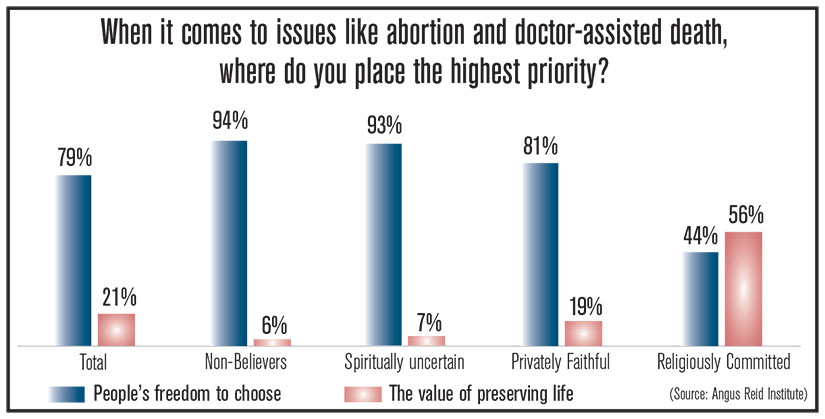Fifty-nine per cent of Canadians told Angus Reid their faith is either “very important” or “quite important” to how they deal with major life challenges and problems. More than half, 52 per cent, say they apply their faith when thinking about public issues. A solid majority of 55 per cent say faith is important to how they conduct their day-to-day lives. A similar number, 54 per cent, say their personal identity — how they see themselves— is formed by faith.
Women were the most likely to confess the importance of faith to the pollsters. And faith is more important to Canadians as they get older. For women over the age of 55, more than two-thirds (69 per cent) said their faith is either “very” or “quite” important in dealing with major challenges and problems. For men between 18 and 34, 47 per cent said the same.
Fr. Murray Kuemper is not surprised and he is heartened by the idea that people know who they are, what they think and how they will act because of faith.
“Faith and active engagement in faith certainly makes a difference in terms of the issues that are then spoken about,” said the St. Peter’s Seminary lecturer in moral theology in London, Ont. “It shows that faith still has a place in the public discourse. People of faith certainly have and need to have an involvement in the public sphere.”
The Angus Reid measure of faith comes from an online poll of 2,006 adults from coast to coast conducted between March 29 and April 3. The pollsters consider a sample this size accurate to within plus or minus 2.2 percentage points, 19 times out of 20.
 (Graphic by Lucy Barco)
(Graphic by Lucy Barco)
Individual freedom, the freedom to choose, remains a strong value for Canadians when it comes to the two issues most often associated with religious conviction — abortion and euthanasia. Four out of five Canadians (79 per cent) chose “people’s freedom to choose” over “the value of preserving life,” when asked which is the highest priority.
Only among the most religiously committed — one-fifth of Canadians — did a slim majority of 56 per cent choose life over the freedom to choose.
“They don’t want to tell other people what to do,” said Kuemper. “Very few of us want to tell people what to do. I don’t want to tell people what to do.”
But day-to-day experience and other polling data tells Kuemper large numbers of Canadians actually believe there should be some restrictions on abortion. A February 2016 poll by Ipsos found 43 per cent of Canadians favoured some restriction on abortion, versus 57 per cent who said it came down solely to a woman’s right to choose.
“If people could get the courage to actually speak from their convictions, we might be looking at some different numbers,” he said. The poll also revealed Canadians want nuance in how they speak about right and wrong. On the one hand, two-thirds of Canadians (68 per cent) say that “what is right and wrong depends on the circumstances”versus just 32 per cent who think “things are almost always either right or wrong.”
But that doesn’t mean Canadians are moral relativists who reject objective moral law. A similar two-thirds choose the statement “there are universal rights and wrongs that apply to the whole human race” over “answers to moral questions will be different for different cultures and people.”
“That’s really important —that there is a sense of common human nature,” said Kuemper.


